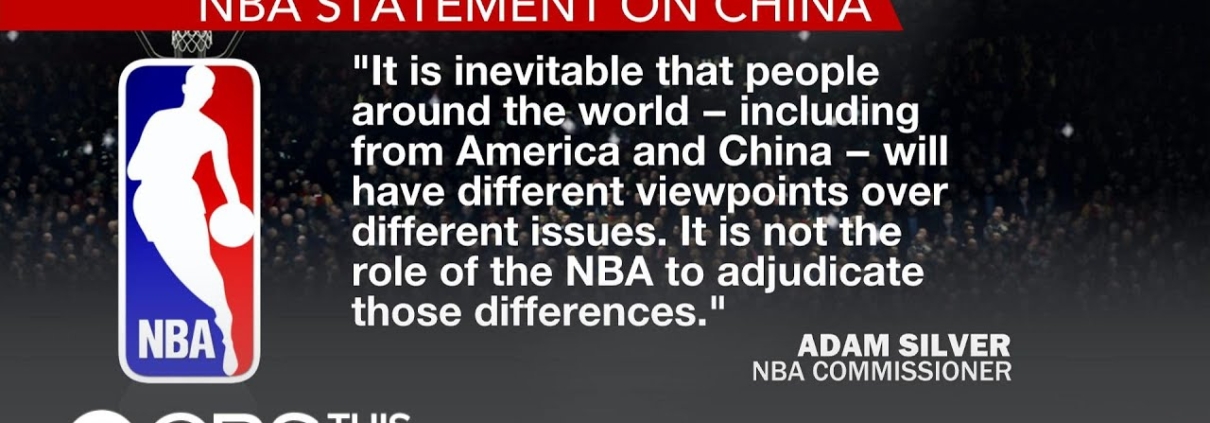Corporate Values at Water’s Edge, Private Sector Pravda, & Science Is Real (Until It’s Not)
Here’s What You Need To Know
When the NBA brought preseason games to China this month, they were expecting positive press and an opportunity to leverage a shared love of basketball to strengthen ties between cultures and continue the growth and popularity of the league overseas. Instead, the NBA was plunged into a full-blown public affairs crisis by its reaction to a posted-then-deleted tweet by Houston Rockets General Manager Daryl Morey supporting the Hong Kong pro-democracy protests.
The since-deleted tweet, and especially the bungled response from across the league, sent shockwaves throughout corporate America as companies and customers faced uncomfortable questions about corporate values in the United States and abroad, and how brands engaging as politically enlightened at home are exposed to greater reputational risk if their actions abroad contradict that narrative. With the world smaller than ever and today’s public affairs environment fraught with risk, here’s what companies operating globally can do to help minimize the risk they may face:
- First, Some Background: The NBA spent a decade building its $4-billion business in China and it’s the most popular sports league in the world’s most populous country. Morey’s tweet – which he promptly deleted and apologized for – caused swift outrage from the Chinese government, with Chinese entities such as state-run television suspending plans to broadcast pre-season games and sponsors halting cooperation with the NBA. The NBA’s sluggish response, including NBA Commissioner Adam Silver’s first statement that seemingly appeased the Chinese government and then a later one that clarified the league’s support for free expression (although that support differed from Mandarin translations of his comments), only added to the controversy.
- Reputational Risk Goes Worldwide: This controversy illustrates the reputational risk facing companies and organizations operating globally, and particularly those based in free countries that have decided to embrace corporate activism and engage in key societal issues in the public arena. This corporate activism may be a component of a brand to capitalize and engage a customer base in one country, but it can lead to turmoil when corporate and financial interests overseas clash with an executive’s values and the “cultural values of an enterprise and its home country.” The lesson here is one that applies to any company, organization, or industry that operates around the world – especially in countries whose cultural and political values differ greatly from one to the other.
- More Scrutiny Will Bring Charges Of Hypocrisy: We’ve written about the consequences for companies when their actions are not consistent with the brand’s values. For example, the NBA “gestures towards wokeness” in the U.S., but its business decisions in China seem to present a glaring contradiction to this narrative and a vulnerability. The episode then sparked renewed attention and scrutiny toward other global companies’ actions to appease China, such as Nike (whose stores removed Rockets merchandise in China) and Apple (who removed an app used by Hong Kong pro-democracy protesters to monitor police movement). Under increased scrutiny in today’s globalized world, companies considered enlightened domestically have now opened themselves up to charges of hypocrisy due to how (and who) they do business with overseas. At the same time they may boycott business with states over the result of legislation passed by democratically elected officials at home, they continue to do business with China, Saudi Arabia, and others who defy democratic norms.
- Protecting Your Company From Reputational Scrutiny Amidst Geopolitics: The days when executives of global companies were simply versing themselves in basic cultural customs and phrases are over. Now, companies need to take a cohesive approach that aligns their brand strategy and policy stances both at home and abroad. With the globalization and digitization of scrutiny, inconsistencies and contradictions in any operating environment can quickly be leveraged against a company’s reputation. To help protect your company’s reputation and anticipate domestic and foreign political pressures, you need to assess risk from both a global and local perspective so that you can better understand and address key vulnerabilities – before they are pointed out in the public arena, and before you lose control of the narrative.
Foreign countries with large and emerging markets hold heavy sway over companies seeking access to their consumers. When concessions to gain it are made that contradict company values, the result is reputational risk that can become a full-blown public affairs crisis that can not only jeopardize overseas operations, but those at home as well.
Subscribe to Receive Insights
"*" indicates required fields
News You Can Use
SCIENCE IS REAL (UNTIL IT’S NOT)
If your diet has been impacted by the slew of reports, studies, and advice advocating eating less red meat, well you may be in for a shock. It turns out that an international collaboration of researchers “produced a series of analyses concluding that the advice, a bedrock of almost all dietary guidelines, is not backed by good scientific evidence.” In fact, the certainty of evidence that one should limit red meat to improve health outcomes is “low to very low.”
Faster than you can lunge for that hamburger, opponents of this *new* science such as the American Heart Association, American Cancer Society, and Harvard’s School of Public Health “savaged” the evidence and the journal that published it because it contradicts the *old* science better aligning with their respective agendas. A physicians group advocating a plant-based diet even went so far as to file a Federal Trade Commission petition against the journal.
The new series of analyses also suggest that the meat industry can expect further challenges from environmentalists and animal welfare groups, whose goals (aligned with recent trends) to reduce livestock production and industrial farming are challenged by this new revelation. In the meantime, it’s a good reminder that science and knowledge are always evolving, and that it is crucially important to have the best information possible before implementing policy and regulatory frameworks impacting consumers, companies, and industries.
PRIVATE SECTOR PRAVDA
Much has been made of recent disinformation campaigns and bots on social media stemming from nefarious government actors, and now it’s time for companies and even individuals (!) to prepare to protect their reputations and interests from smearing. After studying the issue by setting up a fake company to commission disinformation projects, threat-intelligence company Recorded Future concluded that “disinformation-as-a-service” is easy to purchase and highly customizable within a broad price range, with sellers that are “exceedingly professional and amenable to feedback.”
For the private sector, strategies to address this increasing risk and protect reputations will likely need to be as robust as those being discussed by policymakers and regulators. With everyone from competitors to investors to activists now having yet another potent tool to wield against them in the public arena, companies would be well served by monitoring key messaging, narratives, and trends targeting them, and gaining a deeper understanding of who may be behind them and why.
RIGHT OR RING?
A new phase in the ongoing struggle between privacy-rights advocates and Amazon’s Ring is underway with more than 30 civil rights organizations publishing a joint letter calling on local, state, and federal elected officials to stop the Amazon security system’s partnership with police. According to the letter, Amazon’s technology makes it easy for police “to request and access footage without a warrant, and then store it indefinitely.”
Amazon Ring has more than 500 partnerships with police departments, who are able to contact Ring device owners – some who received the devices free or at a discount from law enforcement – to obtain video footage when investigating crimes. While Ring has been pressured by privacy advocates for a while now, this letter is the first time that pressure is being directed toward lawmakers who can investigate and perhaps end such agreements between the company and police – a key strategic decision by the activists that other companies facing public pressure campaigns should take note of.
NO GOOD CSR DEED UNPUNISHED
If companies thought they’d keep anti-capitalism at bay with an announcement to put “stakeholders” ahead of shareholders, they have another thing coming. The Business Roundtable’s Statement on the Purpose of a Corporation, signed by 181 CEOs, was intended to outline “a modern standard for corporate responsibility.” Yet now those executives are facing pressure from newly-minted frontrunner for the Democratic presidential nomination Sen. Elizabeth Warren, who is demanding “tangible actions” to implement the principles outlined, such as having companies that earn more than $1 billion in revenue obtain a new federal charter, make 40% of directors employees, and serve an unclear combination of stakeholders instead of shareholders.
An increase of competing political interests holding sway over business decisions could put capital and savings invested in companies at risk, which in turn would threaten hard-earned savings invested into retirement plans for many Americans. If that’s not reason enough for executives to rethink rhetorical or policy concessions to anti-capitalism, then perhaps the lesson is this: no good deed of corporate social responsibility virtue signaling goes unpunished by those questioning the core purpose of corporations.



